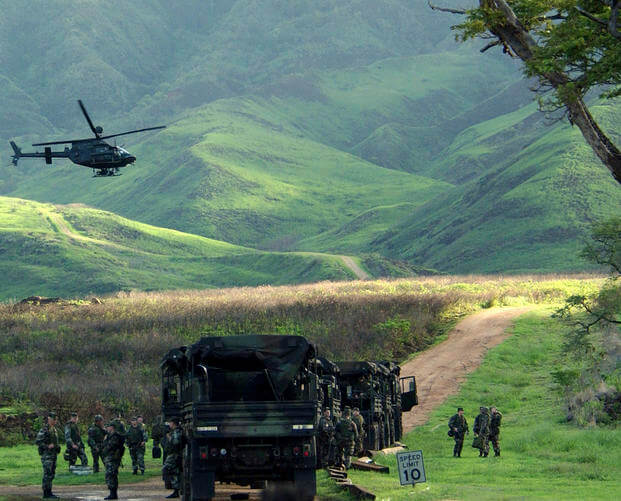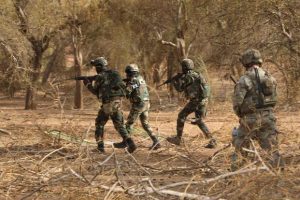The military has officially committed to never resuming live-fire training at Makua Valley, one of its most controversial training grounds in Hawaii.
The military hasn’t fired a shot in the valley since 2004 as a result of a lawsuit brought against it by Earthjustice on behalf of local activist group Malama Makua. Since then the Army has worked to remove unexploded bombs around 22 ancient Hawaiian cultural sites, as well as hosted “cultural access ” days led by Malama Makua members twice a month.
In October, U.S. Army Pacific leadership signed a memorandum stating there are no plans to resume that training, and on Thursday in a joint statement submitted to Hawaii’s federal district court, Defense Secretary Lloyd Austin and Secretary of the Army Christine Wormuth said the military would “no longer need to conduct live-fire training at (Makua Military Reservation), now or in the future, and, therefore, no new (unexploded ordnance ) will be added to MMR.”
On Friday, Malama Makua held a news conference in the parking lot of the training area celebrating the agreement as rain drizzled. Amid the backdrop of the vast green valley, Malama Makua board member Karen Young, widow of the late Malama Makua co-founder Fred Dodge, said she was “cautiously ecstatic “—happy, but also worried that the promises made in court wouldn’t be kept.
The valley holds particular significance for Hawaiian cultural practitioners. In Hawaiian, “makua ” means “parent, ” and the valley is considered the place where human life was first created, according to oral tradition. By the 20th century it was the site of several farms and ranches owned by members of a diverse community of Hawaiian, Japanese and Portuguese families.
The military began using parts of Makua for live-fire training in the 1920s when the islands were governed as a U.S. territory. But after the Japanese navy’s surprise attack on Dec. 7, 1941, the U.S. military imposed martial law in Hawaii and took control of all of Makua for training, which meant kicking out the farmers and ranchers in the valley.
Military officials assured them it would be temporary and that they would be able to return when the war was over. But in 1945, World War II ended and the Cold War began. The military asked Hawaii’s territorial government for the transfer of 6, 608 acres at Makua for training. In 1964, five years after statehood, the Army paid just $1 for a 65-year lease from the state to continue training on Makua and the other leased lands.
“Growing up here in Makaha, this place has always been very special for our community, whether it’s at the beach or when you’re driving past and you get to see this beautiful valley behind you, ” said state Rep. Cedric Gates. “But you can never go inside the valley to enjoy or to practice their culture prior to Malama Makua, and all the access that was provided after fighting many years, and even take decades to get where we are today.”
Gates said “the signing of the document really emphasizes the military’s understanding that there never should have been live firing here to begin with. … We need to build on that, to really return this aina back to its rightful owners, which is the people of our community, especially our Native Hawaiian community.”
In a joint statement released by Gates and fellow Leeward Oahu lawmakers Rep. Darius Kila and Sen. Maile Shimabukuro, they stated that they “are grateful to the Army for stepping up, and we ask for their continued cooperation and full support in clearing all unexploded ordnance before the ‘aina is rightfully returned to our Native Hawaiian community. Today marks the beginning of a full return of Makua back to its people.”
Each military branch used Makua at various points before the last shot was fired in 2004. Ships pounded it with guns from the sea, aircraft dropped napalm and soldiers and Marines fired countless bullets. Malama Makua member Vince Dodge, Fred Dodge’s son, was involved in a cleanup effort in 2003.
“We came across napalm casing, white phosphorus. They also use the valley and it’s very important for the disposal of munitions that get close to their ‘best use’ date, ” Vince Dodge said. “(The explosives ) start getting unstable and nobody wants them around, right ? So they dumped hundreds of tons of munitions offshore in Waianae, some like right offshore, some deep, and they destroyed hundreds of tons of munitions in the valley, as well as chemical waste from Tripler and the university. It was a dumping ground. That’s the way it was back then.”
Dodge said that if the Army leaves Makua, “we don’t want them to run the cleanup because they don’t do that well. The whole military system of contracting is rife with corruption, and it’s about making money and it’s not about doing the job well. The job of cleanup of this valley is going to take decades, right ? It took 80 years to get here today. It’s going to take decades. We need our community to direct that, but we need the Army to put up the money for that—that’s their obligation.”
The Army long insisted that there were no ancient sites in the valley. But wildfires started by live-fire training burned foliage and revealed several ancient sites across the valley. Sparky Rodrigues, a co-founder of Malama Makua, said, “All the historic sites were black, and all the endangered species was wiped out, completely wiped out, from the fire.”
As a result of litigation, the Army has spent millions on archaeological resources, as well as on efforts to reseed the area with local native plants and monitoring endangered species. Dodge said the latest pledge is a “a step in the cleanup and return of this value, which the Army promised to do when they occupied it.”
But though the military officials committed not to resume live fire, and said they intended to step up removing bombs currently there, they are not talking about leaving the valley. The valley is still used for various flight and drone training and other exercises.
“The U.S. Army will continue to execute valuable, non-live-fire training opportunities critical to our mission and soldier readiness at MMR, ” U.S. Army Pacific spokesperson Col. Rob Phillips said in a statement. “The U.S. Army will continue to provide regular community access to MMR for cultural activities per the 2001 settlement agreement. The Army comes with a sense of humility and fortitude that this official announcement will facilitate greater good to the aina and the community here.”
But members of Malama Makua said they want to see military training to stop altogether and see the land returned. During the conference, several called for peace and drew connections between the Army’s seizing of land from Makua residents during World War II and the displacement and killings of Palestinians trapped in Gaza today.
“We all know what’s happening in Palestine and how outrageous that is, ” said Dodge. “We’re going to push all weekend from the outside ; we have good people in the military that are pushing from the inside. … We got to change this thing. There’s been violence and war for a long time, and it just begets more violence and war. That’s been completely proven.”
They also expressed concern that while Austin and Wormuth—who were appointed by President Joe Biden—made the pledge, there’s no guarantee that future leaders will honor it, noting the broken promise to the farmers who called the valley home.
“So yes, we’re happy, it’s a good step, ” said Dodge. “But we also know that it can change at any moment.”
Rodrigues said that he believes the 2021 Red Hill Water Crisis has, in part, prompted commanders to take a more cooperative stance as the military presence in the islands has come under more intense scrutiny. The Pentagon considers the Pacific its top-priority theater of operations, and Oahu is the nerve center for those operations and the Pentagon wants to maintain its footprint in Hawaii.
“I’m always angry and upset, and it’s not new. I’m not the only one, ” said Malama Makua board member Lynette Cruz. “You talk to many other people in the Hawaiian community who had been looking at the impact of military presence on this aina. … Everyone is pissed unless you’ve got a good job with the military presence. Unless you have some kind of a benefit from the military being present, the rest of us are looking at the fact that what happened to our land.”
But Young struck a more optimistic tone, saying she believes “our relationship with the military has evolved. We see their humanity and I think they see ours, and I would like us to go forward. The times are changing, the world is changing and I think we need to also change in regard to that and maybe there’s hope we can work together somehow.”
Rodrigues said that he will look to the native kahuli snail—sometimes called the “singing snail “—as an indicator of whether Malama Makua’s efforts have paid off.
“The kahuli snail sings when the forest is pono, ” he said. “I have never heard the kahuli snail singing yet, but that’s one of the outcomes that we’ll use as a benchmark to the success of the return and cleanup and restoration.”
___
(c)2023 The Honolulu Star-Advertiser
Visit The Honolulu Star-Advertiser at www.staradvertiser.com
Distributed by Tribune Content Agency, LLC.
Story Continues
© Copyright 2023 The Honolulu Star-Advertiser. All rights reserved. This material may not be published, broadcast, rewritten or redistributed.
Please rate this CIBA article
Vote






